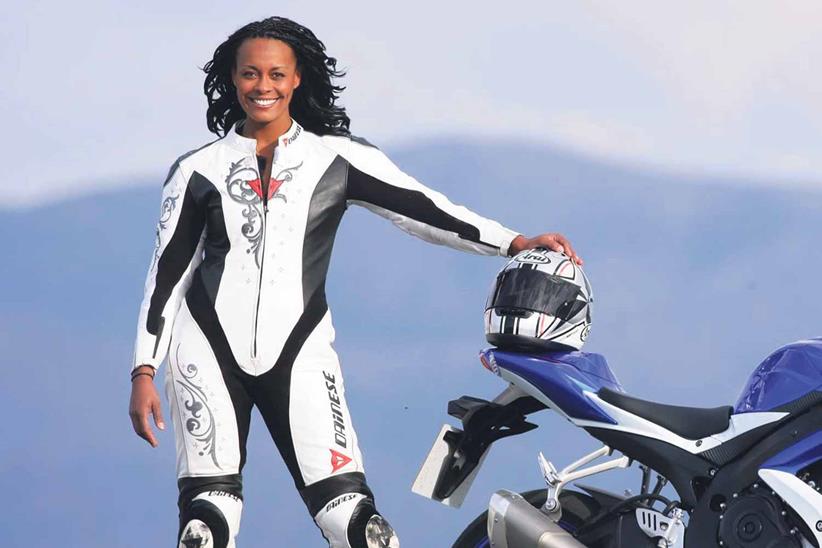Celebrating Black History Month: Ex-bike journalist Jane Omorogbe is one motorcycling's rare high-profile black riders

Most people first became aware of Jane Omorogbe as ‘Rio’ in the late-90s TV phenomenon that was Gladiators (she was also in the film epic, Gladiator). She went on to present a wide array of TV motoring shows and was a BSB reporter, too.
Spending 15 years as a UK bike journalist before relocating to Belgium to start a new life with partner, Renaud Amand, Jane produced the following column for MCN during Black History Month – discussing her experiences of motorcycling. Read it in full below.
Related articles on MCN
- Black History Month: Meet Asher Durham
- Get on a bike following the coronavirus lockdown
- Proposed new rules on phone use at the wheel
![]()
I’ve been racking my brains, but during my 15 years as a motorcycle journalist, I can only recall meeting one other black colleague. I am quite used to being the only black person in an astonishingly wide variety of situations, so much so that it simply doesn’t faze me.
While my skin tone dictates that I belong to an ethnic group, I’m not sure I really understand why seeing another black biker is always such an anomaly. When it comes to motorcyclists and the colour of our skins, is it a cultural or a generational thing that keeps ethnic minority groups away? Or is there something more disturbing going on?
I was raised in a predominantly white environment and although I didn’t start riding until my early 30s, I was introduced to biking through my two uncles as a child. My white uncles.
Isn’t that how it so often happens – being introduced to a new experience, sport, hobby, lifestyle by someone we know? So, could it simply be that many black parents and grandparents just didn’t ride motorcycles and so the conversation that might ignite the spark of interest in the next generation simply didn’t happen?
![]()
I wonder if the answer lies in the BAME community being disproportionately under-represented in motorcycling, to the point where we have such sparse sources of inspiration, of people that ‘look like us’, it seems too alien to consider that it’s available to us.
For such a long time, being a biker was an integral in defining my identity. “I’m a biker.” It meant something about my choice not of transport, but of how I choose to live my life, regardless and in spite of certain expectations that are usually bound inexplicably and illogically (in my opinion) to my race or sex.
Some of my most precious moments have been on a motorcycle. I have memories that will keep my smile alive for years; my weekly commutes to Belgium before I defected, of bike tests and launches, races and rideouts, new friends and a warm sense of belonging.
In those days, I was often asked to represent a female voice in motorcycling but very, very rarely was I approached to do the same for black bikers. I guess the fact that we’re having these discussions now suggests a shift in our society to become more inquisitive and inclusive.
The recent studies of the BAME community in light of the pandemic makes me wonder if a substantial number of black people simply can’t afford to ride a motorcycle due to financial as well as social or cultural restrictions.
One of the reasons me and my partner (former bike journalist Renaud Amand), founded the No Budget Cup several years back was to create an affordable entry level race series for all bikers who were happy to rely on their skills, team and community to be competitive rather than their bank balances.
Yet I don’t recall welcoming any black participants. Are black people actively discouraged from joining the two-wheeled community? In my personal experience, I have never, ever felt discriminated against purely because of my colour or race.
Racism of some form or another has been an ugliness I have frequently been confronted with to varying degrees throughout my life – but not during my career as a motorcycle journalist. I never felt discriminated against because I’m black. I believe my skin tone (and ultimately being female) proved pretty irrelevant.
In all honestly, I suspect the opposite was actually true to some extent: Positive discrimination also exists and sometimes being ‘different’ is not only OK, it’s actually a good thing. But unconscious bias does concern me. It’s the assumptions that impose such subtle and powerful limitations on us, both externally and internally.
By their very nature, these judgments reside so comfortably under the radar that they remain largely unchallenged and ultimately unchanged. Perhaps if we were all a little more open-minded and dare to question our prejudices, it might help level the playing field not just for minority groups, or for women, but for us all. It appears I have more questions than answers. But isn’t that where change begins – by asking the right questions?

